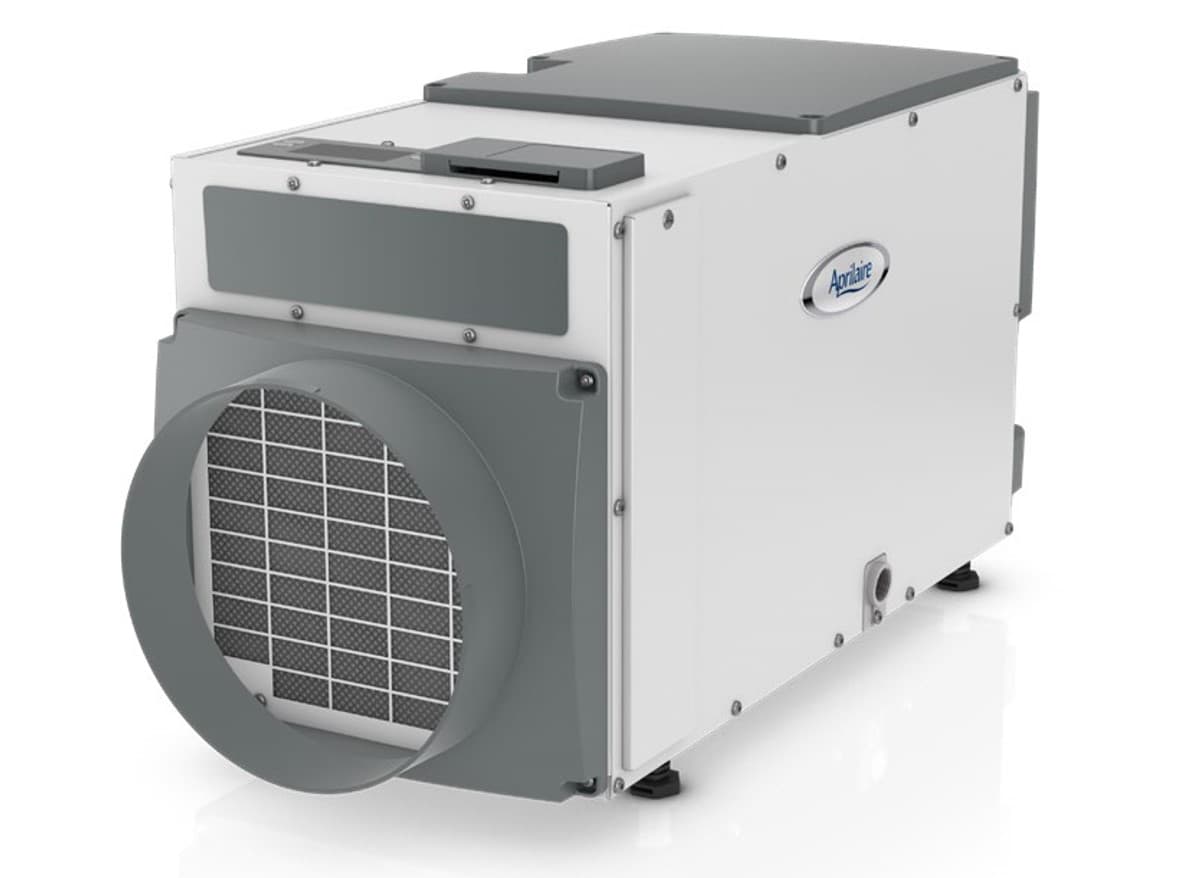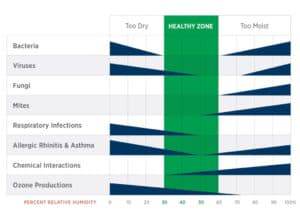What Is a Basement Dehumidifier?

Originally posted 2/18/19, revised 6/7/21
A basement dehumidifier is an appliance that reduces the humidity in the area by filtering and cooling the air. Many homeowners use them during the summer to counteract the mugginess of warm weather. Physical comfort is not the only reason to use them, however- they can significantly improve your home’s air quality, as well as benefit your health.
Acculevel is a family-owned and operated company that specializes in waterproofing and foundation repair. Andy Beery started the company in 1996, with a desire to help homeowners protect and preserve their homes. Our goal is to treat your home as if it were ours, and to provide fairly-priced repair options that give you the best quality results.
In this article, I’m going to explain why we recommend whole-home dehumidifiers and how one can improve your home, your health, and your budget.
Whole-Home Dehumidifiers Are a Better Investment Than Portable Dehumidifiers
They Have Lower Operating Costs
A whole-home dehumidifier is more expensive to buy than a portable one, but it is less expensive to operate. Because it is designed to remove humidity from your entire home, it will operate efficiently, then shut off when it isn’t needed. The unit Acculevel installs can remove 95 pints in a single day, and is designed to cover 5,200 square feet.
A portable unit is only designed to remove humidity from a single room or small living space. But air doesn’t stay in one room, right? It moves around, from room to room and level to level. So a portable dehumidifier just keeps drying air and runs non-stop until you turn it off. Most can only remove 50 pints (or less) per day, and aren’t meant to cover more than 500 square feet.
Your utility bills will be less expensive with a whole-home dehumidifier, because it won’t run as often. You’ll also feel more comfortable in your home, because drier air feels cooler than damp air. This means you can bump up the air conditioner temperature, reducing the wear and tear on your HVAC, and further lowering your utility bill.
Whole-Home Dehumidifiers Are More Convenient
As the humidity is pulled from the air, it turns into condensation that is stored inside the dehumidifier. Portable dehumidifiers have a tank that needs to be emptied regularly; when the tank is full, the dehumidifier stops running until the tank is drained.
Whole-home dehumidifiers don’t contain a tank. The condensation is routed and drained out of the unit, directly into your sump pump or basement drain. This means you don’t have to check it for tank level, or lug the full water tank to a sink to empty.
Greater Longevity and Better Performance
The standard manufacturer’s warranty for a portable dehumidifier is one year. If you add up the costs to buy 5 or more portable units over a 5 years span, the difference in cost drops significantly. This is especially true when you consider the average lifespan of an Aprilaire whole-home dehumidifier is 15 years (the manufacturer’s warranty is 5 years).
Portable dehumidifiers are designed for use in warm weather, because this is when the air humidity is at its highest. But humidity doesn’t miraculously evaporate in the other seasons of the year; humidity can remain year-round in underground spaces like basements or crawl spaces. This is because the soil around your foundation holds moisture far better than the open air above ground. Moisture kept in the ground can then seep into the concrete of your basement walls.
Whole-home dehumidifiers are designed to be installed in basements or crawl spaces. They’ve been manufactured to function in areas of your home that get colder than your living spaces. Removing this moisture from your foundation improves the health and stability of your foundation.
Why Should You Worry About Humidity in Your Basement?
Dehumidifiers are a critical part of most whole-home solutions. They can dramatically improve your home’s air quality, and protect both your home and its contents.
Humidity Feeds Biological Growth
All you need to grow a variety of molds, mildew, and other biological growths is two things: a “food” source and moisture. The dust and debris in air particles are enough to feed these growths, so the moment humidity adds a bit of condensation or moisture to your basement walls, the conditions are right for fuzzy spores to form.
These biological growths are usually accompanied by a very distinctive odor. To anyone highly allergic to molds, the smell alone is enough to cause headaches, nausea, and other side effects. But even if you are the perfect model of health, breathing in mold spores can cause real health problems.
Damp Wood Appeals to Insects
Like mold, insects only need a food source and moisture. Many prefer damp wood, so once humidity adds a bit of moisture to the wooden components in your walls and flooring structure? Your home can become their buffet.
One of the most destructive species is termites. They can go undetected for a long time, because they destroy the wood below the surface layer. Leaving this top layer untouched helps hide them from an untrained eye. They can also be very difficult to treat; we talk more about termites and the damage they do here.
Furnishings and Possessions
High humidity can also damage your possessions. Materials like wood, cloth, and paper will rot if they are left damp. This means things like your furniture, drywall, and books are susceptible to decay. And given how essential cell phones are in our culture, I think we all know what happens if electronics get damp!
Your Lungs and Immune System
Clean and filtered air is critically important to the well-being of you and your family. ASHRAE is the American Society of Heating, Refrigerating and Air-Conditioning Engineers. When they studied the effect of humidity on bacteria, viruses, and other respiratory irritants, they determined that dehumidifiers are efficient at removing viruses from the air.
The table below illustrates that there’s a clear mark at the 50% humidity level. This reduces or eliminates bacteria, viruses, fungi, mites, allergens, and reduces your chances of a respiratory infection.

Will A Whole-House Dehumidifier Solve Your Basement Issues?
Has humidity already created biological growth in your basement? Do you have actual water seeping into your basement? A dehumidifier won’t fix either of these issues. Want to know more about water drainage options for your home? We’ve developed an in-depth guide that reviews everything you need to know about waterproofing, and it is a free resource- no strings attached.
We recommend that you bookmark this webpage for future reference; we update it regularly, as new information becomes available. You can read the chapter that interests you, skim through sections, or take the plunge and read the entire guide, start to finish.
Do you live in our service area? Would you like a free in-home evaluation of your basement? You can request an appointment with one of our knowledgeable and experienced project managers. They will arrive on time, address your concerns, review your home, and give you a detailed written estimate that will provide a whole-home solution.

